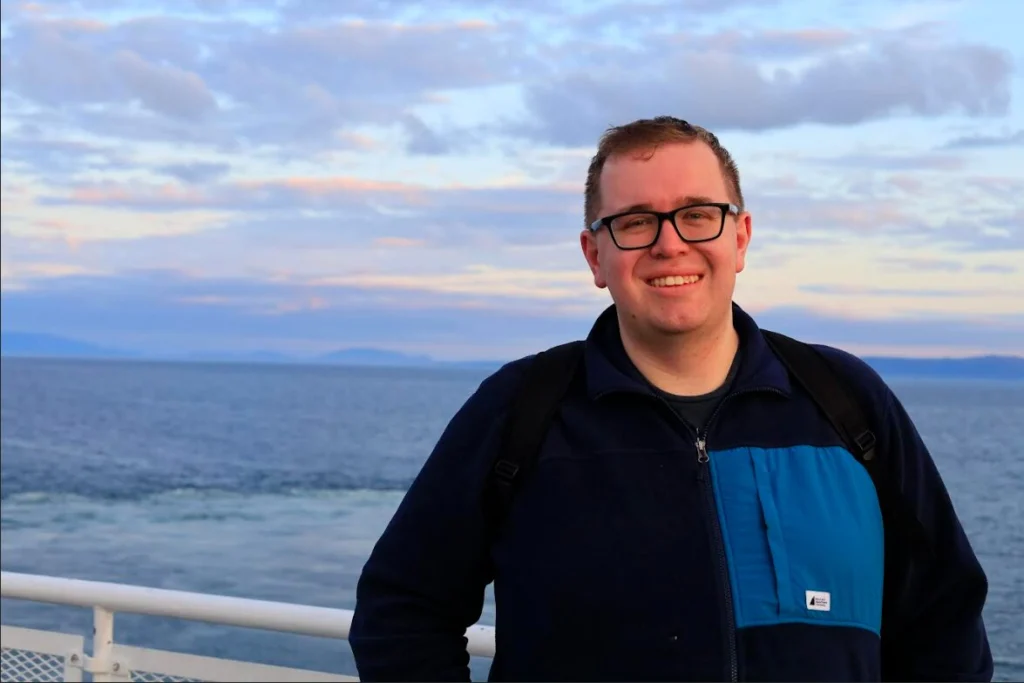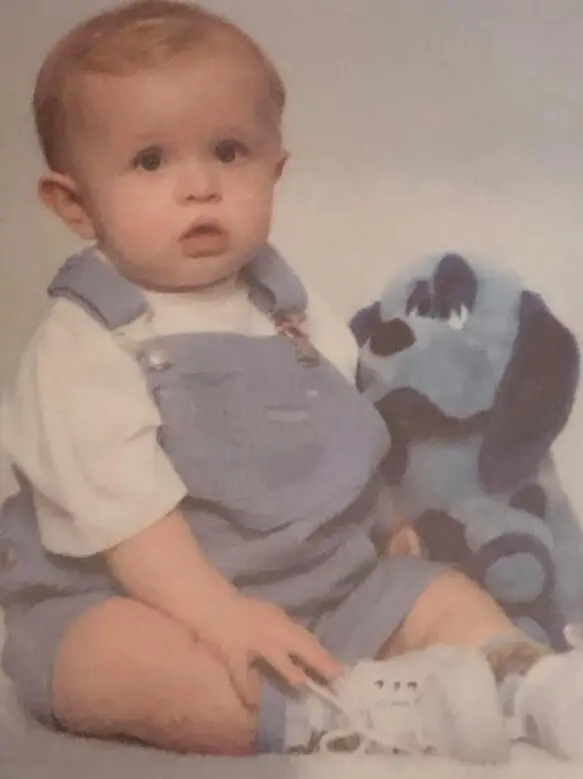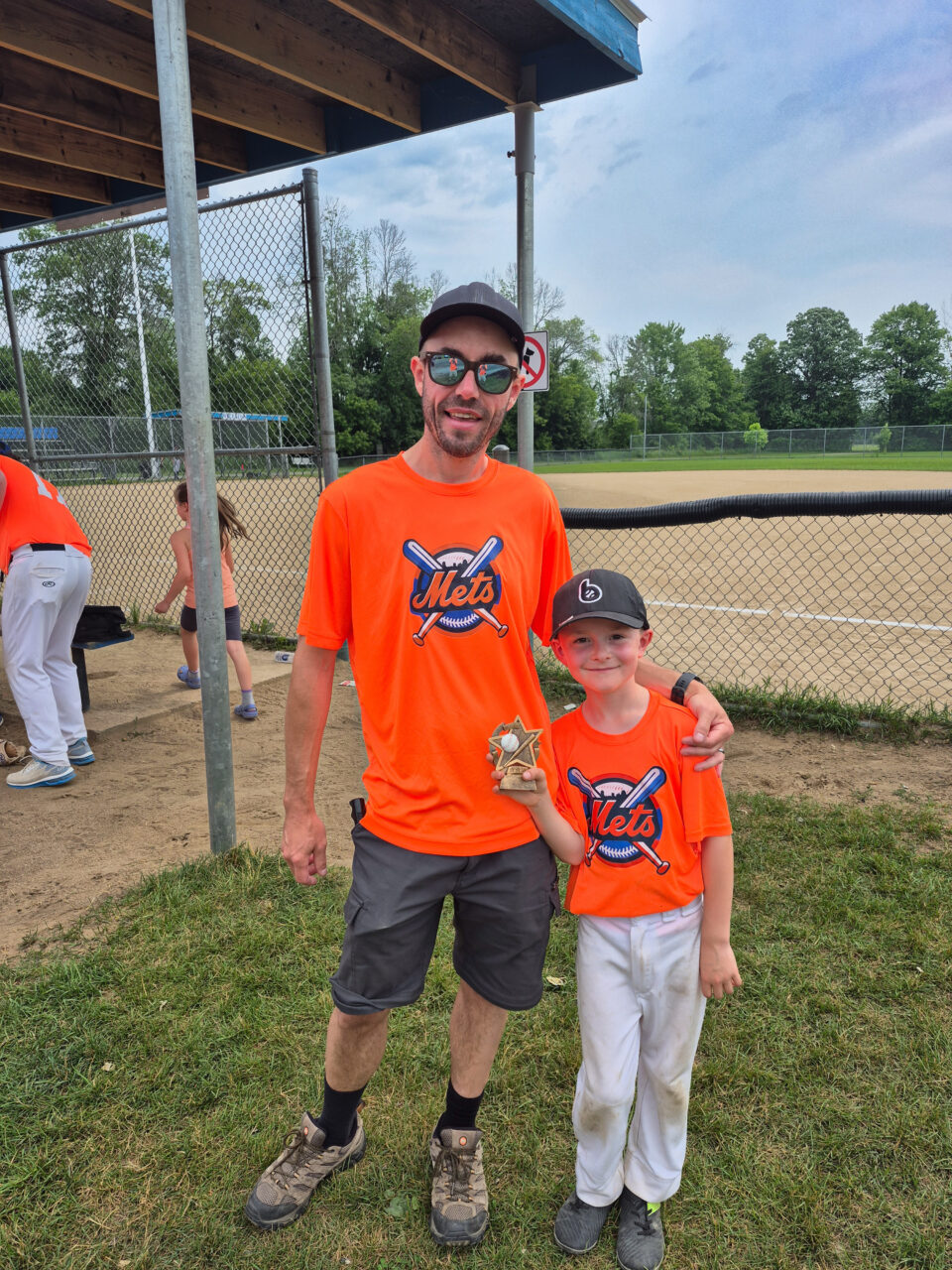
Born with congenital hydrocephalus, Hayden Korethoski found a career helping others navigate the health care system. The 25-year-old Lethbridge resident works as a health care aide and unit clerk at his local hospital. For him, supporting and connecting with people while making a difference in their lives gives him purpose and meaning.
Diagnosed at four months old, Hayden has been fortunate to have had only a few shunt surgeries in his life. His first shunt failed when he was two years old. Recently, he had another shunt replacement surgery, and the shunt is still functioning normally.
“I am grateful for the opportunities that I have taken, and to have the ability to say, ‘Let’s go for it!’ — to go beyond what my body and mind has been capable of. Hydrocephalus has also made me more aware of my body and my needs (which sometimes can also be a little anxiety inducing).

“My experience has made me a better ally to others who have disabilities (both visible and invisible) in my personal life and in a professional context.”
For Hayden, the best part of his job is working as a booking clerk with the radiation oncology team because he can help patients and their families through a very challenging time.
His previous career in a designated supportive living facility and long-term care provided an opportunity to use his personal experience to support seniors who have been diagnosed with the condition.
“But on the flip side, there are moments where the physical symptoms (chronic headaches, fatigue, motor/coordination issues and sensory sensitivities) related to hydrocephalus, that I have faced since childhood, have created these deeply personal feelings of being “different” which can be isolating.
“In elementary school, I participated in a lot of rehabilitative therapy which created a disconnect with my peers but also brought up a lot of curiosity. But there was this sense of pride in being able to share as much as I knew about hydrocephalus even at a very young age which helped me connect in some way.
Hayden describes his childhood as one of tenderness, toughness and adventure. He was raised by his mother, grandparents and many other extended family members who have supported him following his diagnosis of hydrocephalus.
“I am an individual who always notices everything and am very curious about the world around me and I’ve always loved spreading a little kindness and joy everywhere I’d go.
When I was 13, I had the pleasure of attending an outdoor survival camp for a week. At the end, I was awarded the “Bear Grylls award”. This was awarded to me for being the most prepared camper for any situation. This is true testament to my resilience and how I demonstrated courage to go beyond my limits when given the opportunity.
“I have a brother who is 13 years old. Despite the age gap, it always amazes me to be able to learn about the generational differences that we share. We have many good laughs; go on adventures and I’m truly encouraged by him every day with his strength and resilience as a neurodiverse individual while navigating the world around him and watching him grow!
In February 2025, following his shunt replacement in 2002, Hayden had his first neurosurgeon appointment after a scare where he had thought his shunt had failed. He had not had any follow up care until then. He was subsequently referred to the Foothills Medical Centre Adult Hydrocephalus Clinic in Calgary, Alberta. For Hayden, there was much to learn, and it was very emotional, too. He finally had answers. His challenges with speech, movement and feeling clumsy were explained. His surgeon believed he demonstrated signs and symptoms of dyspraxia (a developmental coordination disorder). This created some feelings of grief around his limitations.
“Since my appointment at the Hydrocephalus Clinic in July 2025, I have learned much more about myself than I thought I knew. As someone who values community, I tapped into reaching out to others with a similar diagnosis or those living with other illnesses. I also listened to podcasts that helped bring me at ease through hearing other stories of lived experiences with health challenges. This has inspired me to step out of my comfort zone where I have hidden my story for many years, and to start here with Hydrocephalus Canada to share my story with those who may be newly diagnosed or going through changes in life.
On a positive, Hayden’s neurosurgeon had recommendations to support his health and well-being.
“I look forward to this next chapter of my hydrocephalus journey and to make sure I’m in my best possible health and have the most appropriate tools and strategies as I age.”
Hayden has many helpful strategies for coping with hydrocephalus and for his mental and physical wellness. He likes being in nature and the outdoors. Whether it’s a camping weekend, a short walk to work, or sitting by a lake, they bring him joy. He also enjoys skiing and will be trying paddle boarding for the first time.
Hydrocephalus has not stopped Hayden from leading a full and active life. He recently married and has many interests: cooking, reading, music and he plays the guitar, drums and percussion instruments.
When his symptoms are at their worst (headaches and fatigue) he enjoys naps with his dogs in a cool, dark space and going at his own pace. But most importantly, he likes having meaningful conversations with everyone he meets throughout his day and being kind.
Self-advocacy and being prepared for medical appointments are some of the ways Hayden takes care of himself, but it has taken some practice. He ensures that he has the necessary information in advance, having his wife, Madison or another family member support him during medical visits, or using technology to track how he feels when his symptoms are at their worst. He uses the HydroAssist app (www.hydroassist.org) a mobile application for individuals with hydrocephalus to track and record their symptoms daily.
Hayden is appreciative of the support he has received from Hydrocephalus Canada. In turn, he has made donations to the organization and one day would like to participate in fundraising events such as walks or speaking engagements where he can share his story and raise awareness. Looking towards the future, he would like to publish a book (or many books).
Hayden has this advice for anyone with hydrocephalus: “Whether you are newly diagnosed, going through a challenging time or at the doctor’s office, tap into the community around you. I am a true believer that it takes a village to build someone up and that we need that village to support each other. So, reach out to your friends, family, colleagues, your multidisciplinary team (or whoever you trust) and seek that help and support that you deserve.”

